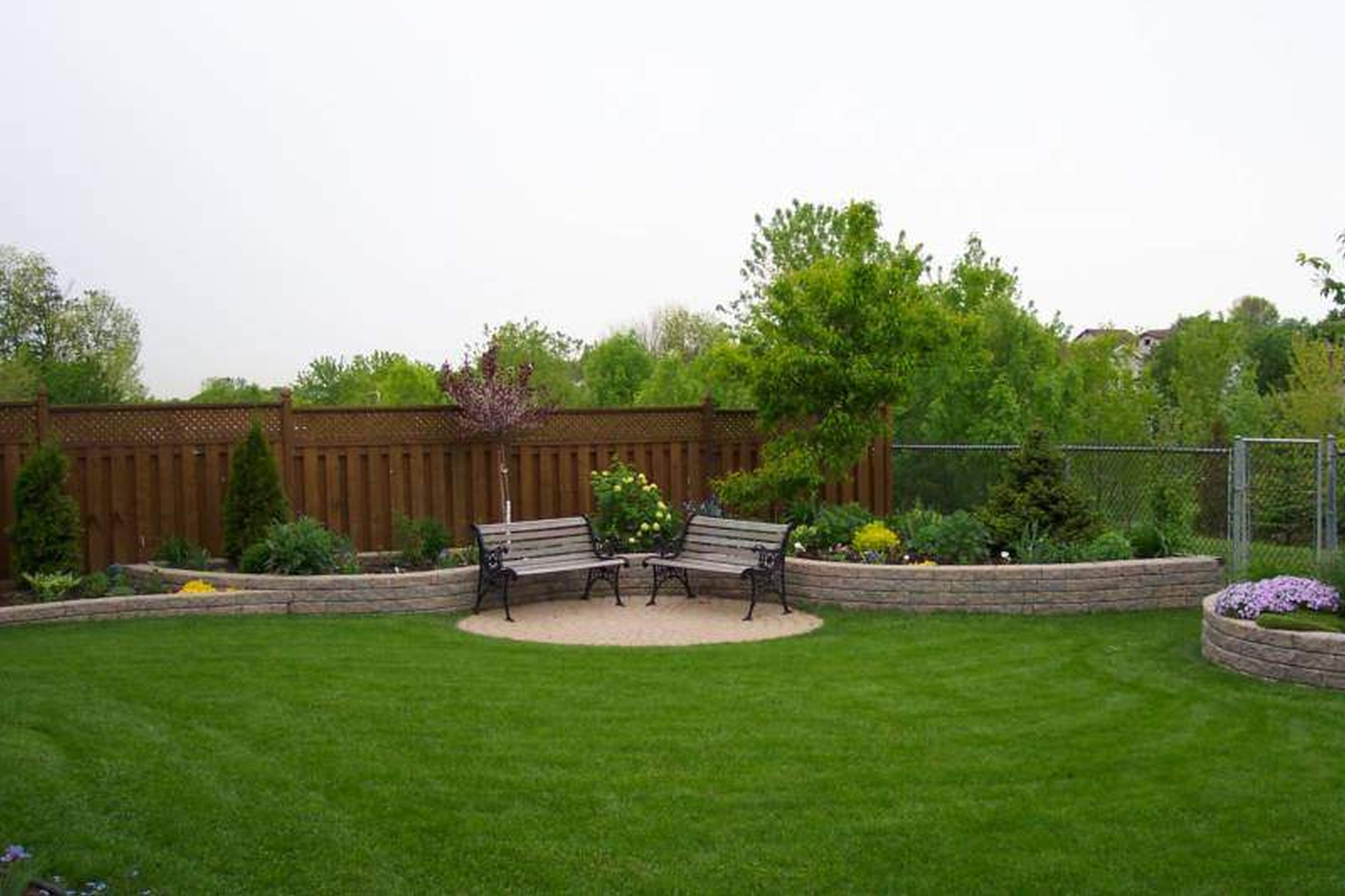Mosquitoes are some of the most annoying creatures on the earth. Apart from spreading notorious diseases like West Nile and Malaria, these little monsters can deprive you of enjoyable times in your yard or on your patio.
Whether you are a gardener, a parent whose child likes to play in the yard, or someone who wants to host backyard get-togethers, mosquitos are often public enemy #1 when it comes to being outside in the summertime.
Luckily, science gave us mosquito repellants and sprays. If you live in mosquito-prone areas, they are well worth the investment.
Best Yard Mosquito Sprays and Repellents
Following are the best yard mosquito repellents and sprays that we have found on the market today. They range from highly natural mosquito solutions, to all-out backyard chemical warfare. Pick the one that works best for you, and in many cases, it won’t be just one — you may find that a combo of a couple products works best during peak mosquito season.
Top 3 Yard Mosquito Repellents from Our Testing
Product | Best For | Check Price | |
EcoGuard Plus | Homeowners looking for the most natural yard mosquito repellent | ||
Cutter Backyard | Those needing effective all-purpose bug repellent | ||
Terminix All Clear | Smaller, targeted areas with lots of foliage. | ||
Mosquito Dunks | Preventative measure on standing water |
Full List of Yard Mosquito Repellent Options
Cutter Backyard Bug Control Spray – Here
Our top choice for most yards. Cutter makes a spray that we have had success with on lawns and landscaping. The Backyard bug control spray does a nice job with up to 5,000 square
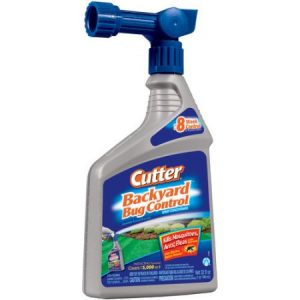
feet, which is a nice swath of many urban yards. It control mosquitoes for up to 12 weeks, but we recommend reapplication after about 9 or 10 if you want to really control the mosquito population. For most parts of the country, two applications a summer will be about right. It gets rid of other bugs too — not just mosquitoes. Works great on gnats and grubs, and there is even some evidence that it helps with ticks too. For that reason, we recommend not treating flowering plants during bloom, just in case it adversely impacts bees.
For best results, use Cutter for the entire summer cycle, not just one application. Target low-lying areas, or areas with vegetation that is more difficult to control.
EcoGuard Plus – for Mosquitoes and Ticks – Here
Our top choice when a more natural yard mosquito repellent is preferred. Ecoguard is probably our second favorite product for broader yard application — a very close choice to the Cutter. It can be applied to active insect areas to manage current populations as well as prevent near-term future populations. It covers 1.5 acres, which is more than enough for most urban and suburban yards. Its advantage is that it is natural and biodegradable, making it a more natural choice than Cutter….. although just because something is natural doesn’t mean you shouldn’t take care to keep it away from bee populations. Like the Cutter product, it should be reapplied every 3-4 weeks for best results.
Our experience with both Cutter and Ecoguard is that you will see some reduction in mosquitoes after the first application. After the second application is really when you will see the mosquito population drop. If your problem is with hornets or yellowjackets, you will need to go with a more specific product, Cutter won’t work as well on them.
When applied correctly and at the right time, you should see very good immediately result on ants, mosquitoes, and spiders.
Terminix All Clear Mosquito Bait & Kill – Here
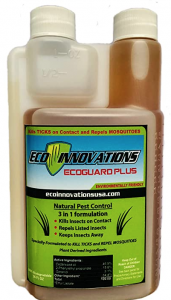
This is the perhaps most effective and cheap solution for repelling mosquitos in your yard. It consists of spray foliage with garlic oil which attracts the mosquitos then kills them in a day or two by making them sick. It reduces the population by 90% when sprayed in the yard. Unlike some of the others, it comes in a smaller aerosol-type canister so is suitable for smaller, more targeted application. It is non-toxic, something we appreciate.
Our field test was very promising, with some near-immediate results on mosquitoes and spiders. We wish it was normally sold in smaller containers, because rarely do we need to treat a smaller area, but it is what it is. Based on our experience, we think this is a very effective product, and branded as non-toxic by the manufacturer (although we didn’t test for that).
Thermacell Mosquito Lantern – Here
You are not going to get an entire yards-worth of coverage from the Thermacell mosquito lantern, but you can get 15 feet of protection around the lantern. If you combine 3 or 4 of them in strategic spots, that is enough to cover a typical patio or deck, or even set near a kids playset. It is DEET-free and doesn’t spray anything out from the unit, and seems to work very well when we have tested it. It is also attractive, and will blend in to the surroundings. Not meant to be run continuously, just when people are in the vicinity.
We find that the mosquito lanterns do a great job in smaller areas, but the butane will run out if left on for a long period of time. The lantern is not silent — it is not loud, but you will know it is on. A factor if you are trying to use it in a peaceful reading hammock or for a romantic al fresco dinner!
Excellent Mosquito Repellents for Your Skin
We did a whole piece on mosquito repellents, but in a nutshell here are a couple of our favorites.
Repel Lemon Eucalyptus – Here
Lemon Eucalyptus Oil is obtained from the leaves and twigs of lemon-scented eucalyptus plant. It has a sweet odor. In the old times, people use to burn the leaves and twigs of this plant to
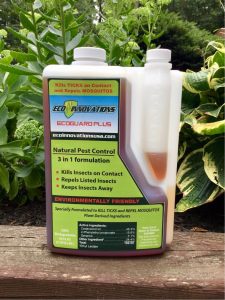
keep away the mosquitoes and other insects. Lemon eucalyptus oil is considered a vital insect repellant. Repel Lemon Eucalyptus is DEET-free and repels mosquitoes for up to 6 hours. It contains all the essential components to keep those little monster away without causing damage to your skin.
Sawyer Fisherman’s Formula Picaridin Insect Lotion. Here.
Picaridin is a synthetic compound prepared by a Bayer Germany in the 1980s. It was made to resemble a naturally occurring compound known as piperine. Picaridin is a widely used insect repellant. It is used to repel mosquitoes, ticks, and biting flies. Sawyer Fisherman’s Formula Picaridin Insect Repellent is DEET-free, gear safe and repels mosquitos for as long as 8-hours.
Natrapel 12 Hour – Here
The main ingredient in Natrapel 12-hour is picaridin. It gives a strong protection from the mosquitos for 12 hours. It doesn’t cause any irritation on the skin. Natrapel 12 hour is a DEET-free mosquito repellent which makes it safe to use. Unlike some of the other things mentioned here, this one is suitable for application directly on the skin.
One nice byproduct of using Natrapel is that it works pretty well against black flies as well, if that is of concern in your situation.
Other Solutions for Yard Mosquito Elimination
Besides yard spray and skin repellents, there are a few other things you can use in your battle against the mosquitoes in your yard.
Mosquito Bits and Dunks
Some would say that if you are trying to get rid of the mosquitoes you see in your yard, you have already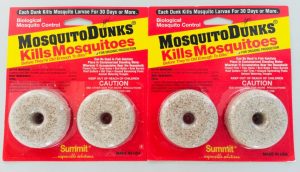 lost part of the battle. If you want to keep your yard free from mosquitos, don’t just think about repelling them. You also need to take efforts to take action against the root case and reduce the mosquitoes’ ability to thrive in the first place.
lost part of the battle. If you want to keep your yard free from mosquitos, don’t just think about repelling them. You also need to take efforts to take action against the root case and reduce the mosquitoes’ ability to thrive in the first place.
If you have standing water in your yard, such as in a pond, big water feature, or even old buckets, tires, or gutters that tend to hold standing water, we suggest you use mosquito bits and dunks. Bits and dunks are one of the main weapons used when it comes to mosquito control in ponds. Bits and dunks can prevent mosquitoes from growing into adulthood, which really gets to the fundamental issue surrounding mosquito populations. They are easy to use, and appear to be safe on the environment (other than mosquitoes!).
In our opinion, any yard mosquito control program that does not include attempt to eliminate mosquitoes at their source is incomplete. We highly recommend using dunks and bits. (find them here on Amazon)
Allethrin Lamps
These lamps offer some of the cheapest solutions to get rid of mosquitos and sand flies. Allethrin lamps use a flame to activate the chemical repellent which is Allethrin. They typically cover areas of 15 feet. Allethrin is from the Pyrethroid family of insecticides. Think of it as a naturally-occurring chemical, put on steroids inside a lab. Safety is generally considered OK, but always use per the manufacturer’s directions. And keep in mind that pyrethroids harm bees, so be judicious about where you use these lamps. They are not intended for complete yard mosquito control, only spot-duty on those areas with human like a patio or play area.
Mosquito Misting Systems
These systems spray a mist of insecticides to kill the mosquitos, flies and other insects in your outdoor spaces. Most systems are either drum-based or tankless and can be controlled by
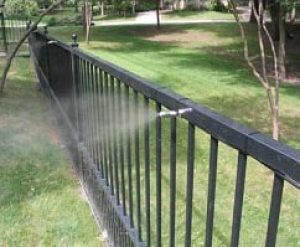
remote control or set on a timing schedule. The main compound present in these systems is Pyrethrin. It is less toxic to the humans as compared to the other compounds available in the market. When the system is turned on, the machine sprays a fresh batch of a misting formula. It is very effective but a bit expensive. It costs around $700 – $1000. It takes professional help to install this system. See more here.
Portable Mosquito Traps
Mostly, these traps utilize the mosquitos sensing abilities to trick them by using special chemicals which mimic the smells associated with people. They are less expensive than the misting systems, and a single unit covers an acre. These traps take at least 10 days to show you the significant results. Different brands use different methods of attracting the mosquitos. The Mega-Catch is one of the most reliable portable mosquito trap manufacturers. They rely on lighting systems, infrared heat and carbon dioxides to attract mosquitos. Portable Mosquito traps are safe and utilize very less electricity. See more here.
Mosquito Foggers
We did an entire piece on the best mosquito foggers, so refer to it for more information. But you can always use a fogger, either a smaller propane-powered one, or a heavy-duty, gas-powered commercial duty one. Both do a good job and give you the ability to cover lots of ground. Mosquito foggers are especially good options if you have an idea of where you mosquitoes congregate and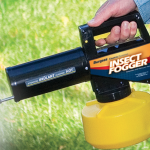 you want to find them where they are.
you want to find them where they are.
Traditional Methods
Following are the traditional methods use to keep away the mosquitoes:
• Mosquito Netting is used all over the world for mosquito protection and can be used as a decorative outdoor curtain.
• Citronella Candles use oil of citronella as a main ingredient which is known for repelling mosquitos and bees. According to a study published in the National Institute of Health Library, they reduce the mosquitos by 50%. The greatest benefit of using citronella candles is that they are safe and non-toxic to humans as well as your pet animals.
Does Mosquito Yard Spray Kills Bees?
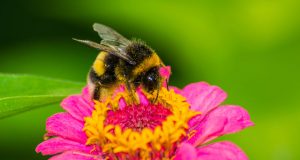
Bee health has been a major topic of public awareness in recent years, and for good reason. Bee populations are down an estimated 60% from where they were in the mid 1900s. Speculation is that this is caused not only by the loss of habitat and food, but also from the use of pesticides. Specifically, chemicals in the neonicotinoid and pyrethroid family are believed to cause major destruction of honeybee populations. Always assume that any chemicals you are using for mosquitoes will adversely affect bees, as many of the products we recommend above have a pyrethroid base. The last thing we want to do is have you overdo it and harm our important honeybee and bumblebee populations.
What can you do to make sure that your attempt to make your yard safe from mosquitoes doesn’t backfire and kill our pollinators? Apply any of these chemicals sparingly and only where needed, and always avoid spraying on to flowers or any blooming vegitation. Focus on long grasses, swampy areas, and non-blooming weed patches.
Relatedly, while we find the chemical permethrin to be one of the best tick repellents around, it is highly toxic to bees. That is why we only suggest you apply it to your clothing and footwear, never to broad areas of vegetation.
The “when” is nearly as important at the “where” when it comes to using chemicals safely around bees. Give bees time to enjoy the spring bloom before you go all-in on treating your yard with any of the more synthetic chemicals. In most areas, everything from trees to ground cover are blooming in the spring, and these blooms are important to bees. Wait a bit and let that phase pass before bringing out the big guns.
Does Homemade Mosquito Yard Spray Work?
It can be temping to use homemade mosquito yard spray if you are trying to save some money. Perhaps you got a mix recipe from a neighbor or friend and figured you would give it a try. Maybe you want to make something that is a bit more natural or earthy. Will it work?
We do not recommend using homemade mixes for mosquito yard spray. We like using products that have been tested and are made with some level of quality control, and products with ingredients that are carefully measured per the label. Stick to the tried and true.
When Should I Spray for Mosquitoes, and How Often?
Mosquito control measures are best done early in the season when mosquitoes are active, which obviously varies by region. You want to begin combatting mosquitoes as soon as the eggs begin to hatch, which generally speaking is when temperatures are regularly above about 50 degrees on a daily basis.
As for time of day, it is best to spray for mosquitoes when they are out and active, since most of the chemicals are intended to control the mosquitoes on-contact. You want as many mosquitoes around as possible. This means dusk, or late evening if you have the light to do it, is a great time to spray. Alternatively, very early morning works too.
What Chemicals to Professional Mosquito Control Companies Use?
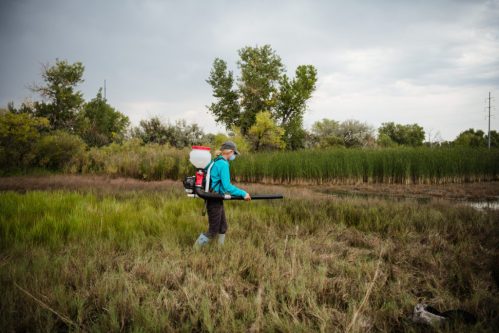
Most companies who do mosquito control as part of their pest control offering use some sort of pyrethrin or pyrethroid as their base chemical. Yes, pyrethrins are not at all bee-friendly, so if you go this route you want to take that into consideration. Any good pest control company will be able to explain to you, with specificity, what kind of chemicals will be used on your yard.
Not all companies use pyrethrins, and more and more are offering an option that is friendlier to pollinators. Assuming pollinators are important to you (and not just bees — butterflies, moths, etc.), then take care to talk to your mosquito control provider about options that do not involve harmful chemicals. This is especially important when the application will be done over a broad and expansive swath of land or swamp.
There are some firms that are using more bee-friendly techniques for their mosquito treatment, but they are not as common and typically more expensive.
The other option is always to use these chemicals, but strictly limit the area of application to the known mosquito hotspot versus doing your entire yard.
Are Yard Mosquito Repellents Safe for Dogs?
Some are. This is an area where you want to do your research and be sure you are buying a product that fits your needs.
Generally speaking, if you have dogs or pets that are likely to lick or roll around in the repellent residue, you should try to stay away from chemicals containing:
- DEET
- Parathion
- Malathion
- Methomyl
- Fenoxycarb
Now, some are worse than others. For example, pyrethrin is much more harmful to cats than to dogs.
Some are OK for older dogs, but not for young pups (or for cats). They include:
- Pyrethrin
- Permethrin
The good news is that there are many mosquito repellents safe for dogs. Among the ones we prefer are ones containing:
- Basil
- Catnip
- Lemon Balm
- Lemongrass
What About Mosquito Repelling Plants?
Many article discuss the merits of mosquito repelling plants. Plants can move the needle on the number of mosquitoes in a very localized area, but they aren’t going to make a dent in the overall mosquito population in a broader area. So we don’t recommend using mosquito-repelling plants as your only strategy for skeeter control, but it can help in many situations.
Our favorite mosquito-repelling plants for a yard or home landscape are:
- Citronella (but be careful around cats and dogs — it can be harmful for them). Best grown in warm climates.
- Marigolds – Nice, yellow-flowering plant that grows in nearly every region
- Basil – Perennial in warmer climates, annual in colder climates.
- Mint – Hardy herb that grows in many regions.
- Lavender – Best grown in warmer climates.
Is there a DIY Yard Mosquito Spray Alternative?
You can always experiment with homemade or DIY mosquito sprays. If you create one that works well, please leave the recipe here in the comments to others can benefit.
Our one caution: Just because something is made at home doesn’t necessarily make it safer. Chemistry is a weird thing, and mixing two seemingly innocent chemicals can sometimes create a toxic or unhealthy mix. Use the same precautions you would if you worked in a chemical factory, and don’t assume it is safer just because it is homemade.
More Resources
Fighting the good fight against mosquitoes doesn’t just involve repellents and sprays. Take the whole yard approach to controlling mosquitoes. This means taking steps to get rid of standing water and other breeding grounds for bees. We did an entire piece on it, here.
If the mosquitoes are not content outside and are actually making their way into your home, act. You do not want disease-carrying insects biting you while you sleep. Check out our popular piece on getting rid of mosquitoes inside your house. Employing ways to keep mosquitoes out of your house will often have the added benefit of keeping other bugs and insects out, and even keeping your home cooler in the summer and warmer in the winter.
Curious about why those mosquitoes just seem to be coming at you again and again? Our piece on how long mosquitoes live might give you some insights.
Finally, what if you want to go the route of applying mosquito repellent to exposed skin or clothing? Your choices are endless, but we did a roundup, here. There are many repellents to choose from, and each has pros and cons. Furthermore, some repellents have the added benefit of keeping ticks away from you too.

